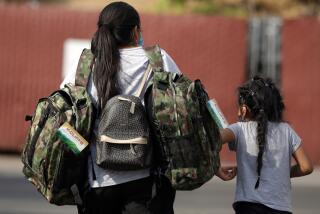Donors Sought to Halt Blood Shortage
- Share via
SANTA CLARITA — The blizzard in the eastern United States and lingering flu outbreaks have depleted transfusion blood supplies by almost half in some parts of the country, say American Red Cross officials who are appealing for donors in Southern California.
For only the second time in the history of the American Red Cross, a national appeal for donors has been issued, said Red Cross spokeswoman Katrina Richardson in Los Angeles. The first time occurred two years ago, when a similar combination of factors caused the blood supply to dip below acceptable levels.
The national concerns have yet to have perceptible impact locally. Several hospitals--including County-USC Medical Center, St. Joseph Medical Center in Burbank, Holy Cross Medical Center in Mission Hills and Henry Mayo Newhall Memorial Hospital in Valencia--all reported relatively normal supplies on hand.
The weather disaster disturbed the fragile balance in the national network of collections in the post-holiday period when supplies are traditionally low, officials said. The outbreaks of flu slashed into the donor ranks further, eliminating infected donors as source.
Even the federal government shutdown, military cutbacks and corporate downsizing cut into donations: Furloughed government workers and vanished military units weren’t available, and many big companies no longer have the large office staffs that formerly contributed en masse in blood drives.
Red Cross officials are concerned that even areas untouched by the inclement weather could be affected if another emergency occurs anywhere in the country.
This is particularly true for large urban centers such as Los Angeles, which imports blood from other parts of the nation, says Cheryle Babbitt, the American Red Cross’ managing director of donor services for the Southern California region.
“We rely on the rest of the country for about one-third of the blood supply used in this area,” Babbitt said. “We are at the mercy of blood collections in other cities.”
Red Cross officials are also warily watching the types of blood they have on hand. Blood type is genetically based and few other parts of the country can claim Southern California’s widely diverse ethnic makeup.
Officials in Southern California constantly gauge the blood supply available for O blood types, predominant among Hispanics, and B blood types, predominant among African Americans.
“Many of the communities we’re receiving blood from are not as ethnically diverse,” Babbitt said. “They don’t have surpluses of the types we need most.”
Blood supplies in the Los Angeles region are low at the moment, a normal consequence of the post-holiday months, Richardson said. The region has 60% of its desired supply of all blood types on hand, or about 2,900 pints.
The supply of O-positive--the most common--is at 64% of the desired level, as it commonly is at this time of year, the officials said. The supply is low, but not critically so, they said.
In addition, some blood supplies have been shipped to the East to make up for greater shortages there.
The emergency in the East has dragged down supplies nationally. Snow shut down 13 of 42 collection centers for days at a time in the snow-buried states of the East. Baltimore collected only 30% of its desired supply, or 1,753 units, while Philadelphia dropped in half from a predicted 6,108 units to 3,089 units.
“We just have our fingers crossed,” Babbitt said, “that there might not be some unforeseen need.”
Concern about its own supplies prompted Antelope Valley Hospital Medical Center to issue an appeal for all types of blood, particularly for types B-positive and B-negative and O-positive and O-negative.
“It hasn’t reached a critical stage,” said Gary Cothran, the hospital’s spokesman. “We’re just trying to increase people’s awareness to get them to come in.”
The national Red Cross appeal has gained increased gravity because national blood donations have declined incrementally over the last five years from 6.1 million units in 1990-91 to 5.74 million last year. The Red Cross in Southern California collected 405,000 units of blood in 1983, and last year it collected only 206,000 units.
Military and corporate downsizing has also cut back the number of donors, Richardson said.
The fewer employees there are at big corporate offices or on military bases, the fewer donors are available for large-scale organized drives. And since those at work have more tasks, fewer are inclined to take time out of the day to donate blood.
Gone are the days when the Southern California region could count on a mega-donor such as Lockheed to provide 1,000 units in a single blood drive. The average blood drive today nets only 45 units.
Telecommuting has further eaten into the ranks of those who donate during a company blood drive.
“Over the last five to 10 years it has been more and more difficult to recruit and retain blood donors,” Richardson said. “Our donor bases are not there.”
To counter the decline, the Red Cross has tried incentives, such as giving away T-shirts or cholesterol screening tests.
The nonprofit organization has also learned that donors have their preferences in the little extras that come with blood donation. The Atlanta chapter faced a near revolt by regular donors when it temporarily tried to save money by not supplying Nutter Butter cookies--popular in the South--to those who had just given blood.
But despite the drops in donations, Red Cross officials hope to regain a balance in supplies by February.
“We don’t want to alarm the public,” Babbitt said. “It’s not one of those problems we can’t solve. We have an answer: Sign up and donate.”
More to Read
Sign up for Essential California
The most important California stories and recommendations in your inbox every morning.
You may occasionally receive promotional content from the Los Angeles Times.













